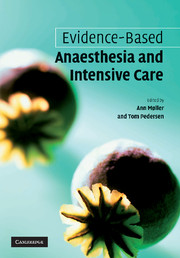Book contents
- Frontmatter
- Contents
- Foreword
- Contributors
- 1 Introducing evidence-based anaesthesia
- 2 How to define the questions
- 3 Developing a search strategy, locating studies and electronic databases
- 4 Retrieving the data
- 5 Critical appraisal and presentation of study details
- 6 Outcomes
- 7 The meta-analysis of a systematic review
- 8 Bias in systematic reviews: considerations when updating your knowledge
- 9 The Cochrane Collaboration and the Cochrane Anaesthesia Review Group
- 10 Integrating clinical practice and evidence: how to learn and teach evidence-based medicine
- 11 Involving patients and consumers in health care and decision-making processes: nothing about us without us
- 12 Evidence-based medicine in the Third World
- 13 Preoperative anaesthesia evaluation
- 14 Regional anaesthesia versus general anaesthesia
- 15 Fluid therapy
- 16 Antiemetics
- 17 Anaesthesia for day-case surgery
- 18 Obstetrical anaesthesia
- 19 Anaesthesia for major abdominal and urological surgery
- 20 Anaesthesia for paediatric surgery
- 21 Anaesthesia for eye, ENT and dental surgery
- 22 Anaesthesia for neurosurgery
- 23 Cardiothoracic anaesthesia and critical care
- 24 Postoperative pain therapy
- 25 Critical care medicine
- 26 Emergency medicine: cardiac arrest management, severe burns, near-drowning and multiple trauma
- Glossary of terms
- Index
17 - Anaesthesia for day-case surgery
Published online by Cambridge University Press: 05 September 2009
- Frontmatter
- Contents
- Foreword
- Contributors
- 1 Introducing evidence-based anaesthesia
- 2 How to define the questions
- 3 Developing a search strategy, locating studies and electronic databases
- 4 Retrieving the data
- 5 Critical appraisal and presentation of study details
- 6 Outcomes
- 7 The meta-analysis of a systematic review
- 8 Bias in systematic reviews: considerations when updating your knowledge
- 9 The Cochrane Collaboration and the Cochrane Anaesthesia Review Group
- 10 Integrating clinical practice and evidence: how to learn and teach evidence-based medicine
- 11 Involving patients and consumers in health care and decision-making processes: nothing about us without us
- 12 Evidence-based medicine in the Third World
- 13 Preoperative anaesthesia evaluation
- 14 Regional anaesthesia versus general anaesthesia
- 15 Fluid therapy
- 16 Antiemetics
- 17 Anaesthesia for day-case surgery
- 18 Obstetrical anaesthesia
- 19 Anaesthesia for major abdominal and urological surgery
- 20 Anaesthesia for paediatric surgery
- 21 Anaesthesia for eye, ENT and dental surgery
- 22 Anaesthesia for neurosurgery
- 23 Cardiothoracic anaesthesia and critical care
- 24 Postoperative pain therapy
- 25 Critical care medicine
- 26 Emergency medicine: cardiac arrest management, severe burns, near-drowning and multiple trauma
- Glossary of terms
- Index
Summary
The practice of day-case surgery has grown substantially over the last 20 years. It presents some clinical and organisational challenges, as patients are discharged home promptly after surgery. This chapter summarises the results of a systematic literature search published between the dates of 1990 and July 2005. We have concentrated on clinical aspects of day surgery, which we feel are most relevant to anaesthetic personnel. Whilst we have attempted to concentrate on practice specific to day surgery, we have reported on studies which have included inpatients when we felt this was either relevant or the only evidence available. We have made it clear throughout which work is not restricted to day surgery.
When day surgery was first introduced, it was felt that only healthy patients without systemic disease were suitable. The evidence which we have summarized suggests that although patients with systemic illness have a higher incidence of minor intraoperative events, they are not at increased risk of unexpected hospital admission or major morbidity and mortality.
Otherwise healthy patients are often subjected to a series of preoperative tests. We have found that routine testing, even when abnormal results are found, is unlikely to alter clinical management or improve outcome. We have suggested simple guidelines for testing in patients who are elderly or have systemic disease.
Keywords
- Type
- Chapter
- Information
- Evidence-based Anaesthesia and Intensive Care , pp. 184 - 204Publisher: Cambridge University PressPrint publication year: 2006

